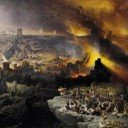The next two posts will deal directly with two very popular “Rapture” passages used by Left Behind theology proponents. Despite the fact that these verses take place way after the tribulation is completed the Left Behind proponent argue that Jesus reverses His thought pattern and beings discussing the rapture well after He is done discussing the supposed seven year tribulation and Second Coming.
The first passage is known as the Days of Noah passage and deals both with the supposed rapture of the church and the presupposed expectancy of a decline of society. The argument is that things will get worse and worse throughout time and that by the time of the rapture society will have reached a time so evil that it will be like the time of Noah where a Godly man was nearly impossible to find.
But is that what the passage actually states?
Matt 24:37 As were the days of Noah, so will be the coming of the Son of Man. [38] For as in those days before the flood they were eating and drinking, marrying and giving in marriage, until the day when Noah entered the ark, [39] and they were unaware until the flood came and swept [took] them all away, so will be the coming of the Son of Man.
The argument proposed is that the world becomes increasingly wicked, the number of Godly men is minute and that Jesus comes and Raptures His church away.
The real question that should asked, though, is what is the primary focus of the passage. Is it dealing with the quality of life at the time of His coming, or does it have to do with the swiftness of His coming? Is Jesus making the case that a sign of His coming is the moral state of society or that His coming will be as much of a surprise as when the flood came upon the people in Noah’s days.
Note the context states that they were “eating and drinking, marrying and giving in marriage.” These are not exactly evil endeavours. These are the things of everyday life. If the point was to point to the horrible moral state of society at that then why did the Lord not stress the evil actions of those alive during Noah’s time. Instead he simply lists the things that people do every day and how they continued to do so up until the time Noah entered the ark.
The point then is that Jesus is discussing the suddenness of His coming. Those in Noah’s day were not preparing for the coming destruction. And note most importantly that it was Noah’s family that “remained” and that those who were “taken away” were those who were killed. It was not good in this instance to be swept or “taken away.”
So this verse is not a warning sign about the decline of civilization leading up to the return of Christ, but rather how sudden the coming destruction (70 AD) would be and the importance of remaining prepared. Either way this should not be seen as being related to the end of time and the second coming, but like the rest of the discourse thus far it is related to the destruction of the city and temple.
The next passage we will deal with is probably the single most popular Left Behind verse in the entire Bible. But is that what the Lord had in mind?
We shall see.





No comments:
Post a Comment